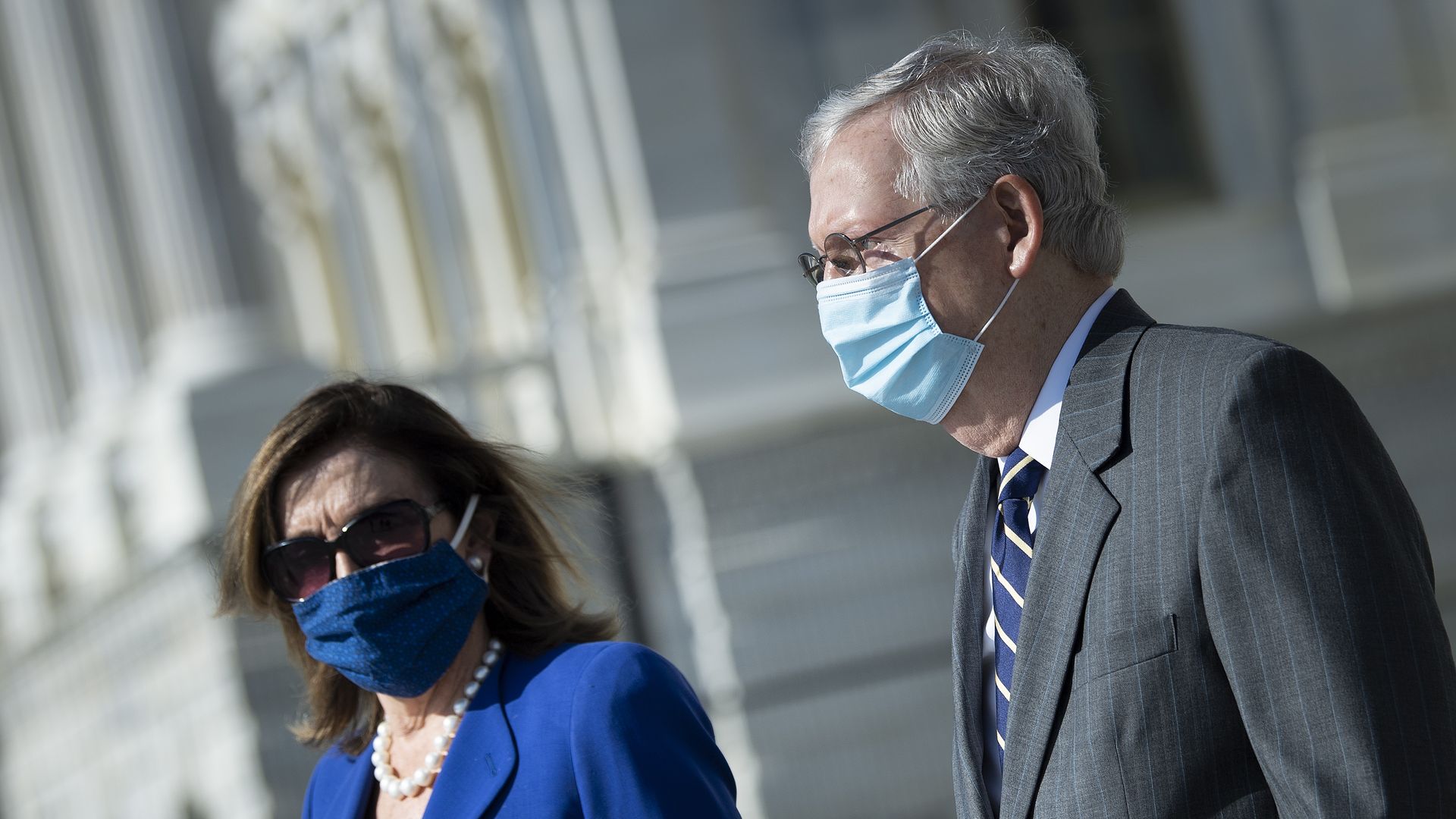Congress releases text of $900 billion coronavirus relief bill

Nancy Pelosi and Mitch McConnell. Photo: Brendan Smialowski-Pool/Getty Images
The House on Monday released the text of a $900 billion coronavirus relief package and $1.4 trillion government spending bill that Congress expects to pass before the holidays.
The state of play: The House will move quickly to pass the bill on Monday night, with the Senate likely to stay late to vote in the early hours of Tuesday morning. This gives lawmakers and their staff just hours to review a 5,593-page bill — one of the largest rescue packages in U.S. history.
Why it matters: The 11th-hour compromise between congressional leadership comes days before many of the existing coronavirus relief measures are set to expire on Jan. 1.
Details...The package includes:
- $600 stimulus checks per adult and child.
- $300 per week in enhanced unemployment insurance for 11 weeks.
- $319 billion for small businesses, including $284 billion for loans given through the Paycheck Protection Program, $20 billion in EIDL Grants, and $15 billion for live venues, independent movie theaters, and cultural institutions.
- $25 billion in rental assistance and an extension of the eviction moratorium.
- $13 billion in increased SNAP and child nutrition benefits.
- $82 billion in education, with $10 billion dedicated to child care.
- $7 billion to increase access to broadband.
- Billions for vaccine distribution and COVID-19 testing.
- Language ending surprise billing for emergency and scheduled care.
- A tax credit for employers offering paid sick leave and extends the Employee Retention Tax Credit.
- $4 billion for GAVI, the international vaccine alliance.
The politics: All sides are trying to claim this a win for their party.
- McConnell’s team is arguing that the bill is very similar to the proposal the Senate majority leader put out in July, and Democrats significantly conceded on the package's price tag, down from the $2.2 trillion they held out for, and a provision for state and local aid.
- Democrats note that the bill is still far more expensive than many Republicans had wanted, and it excludes McConnell's previous red line: liability protection for businesses. It also extends enhanced unemployment benefits and includes a new round of stimulus checks — key Democratic priorities.
- And the bipartisan group that kickstarted the final round of talks can point to the success of their bicameral alliance, which was used as a framework for the final deal.
What to watch: Democratic leaders say they view this deal as a “starter” package — something to tide Americans over until Joe Biden takes office and can pass additional stimulus.
- But some lawmakers, including progressives, are skeptical Biden will be able to do this as easily as Democrats are projecting.
The big picture: Millions of Americans and small businesses have suffered severe economic hardship as Congress failed for eight months to pass another tranche of relief funding.
- Initial weekly jobless claims rose to 885,000 last week, another increase from the previous week and a higher total than the 800,000 claims economists had projected, according to data released by the Labor Department.
- The U.S. poverty rate jumped to 11.7% in November, up 2.4 percentage points since June — making this the biggest jump in a single year since the government began tracking poverty 60 years ago, the Washington Post reports.
- Nearly 12 million renters will owe an average of $5,850 in back rent and utilities by January, per WaPo — showing that people are running out of money for basic needs.
- As many cut back on spending after losing the $600 weekly boost to unemployment checks from the federal government, retail sales fell 1.1% in November, the biggest drop in seven months, per AP.
Editor's note: This article has been updated with more details and the bill text.

